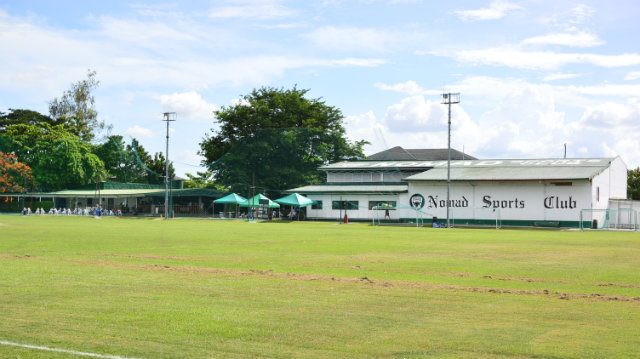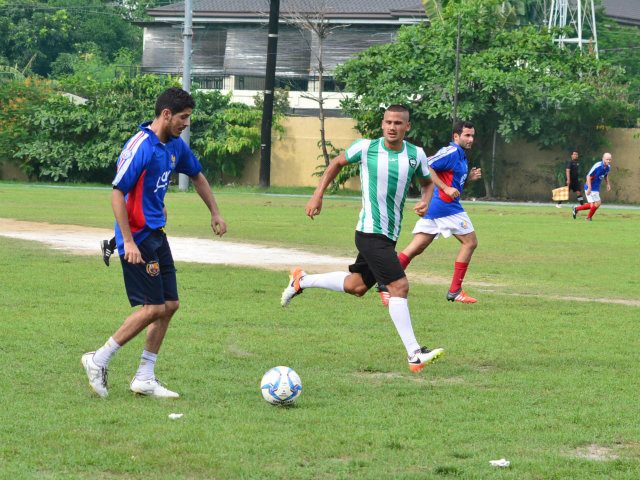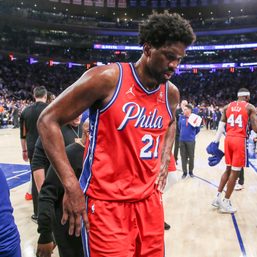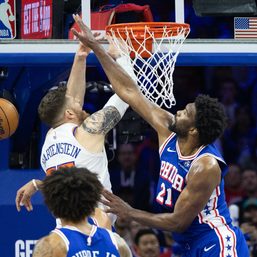SUMMARY
This is AI generated summarization, which may have errors. For context, always refer to the full article.

It’s a Sunday afternoon like so many others at Nomads Sports Club. The sun is shining on its immaculate grass turf. The home team, in their traditional green-and-white striped kits, are playing against a bunch of French expats in blue. Members sip on beers while taking in the scene from the bar beside the pitch. The tackles are hard but fair, and the green-and-whites bark instructions to each other while playing, a classically British hallmark of Nomads teams.
But it isn’t just another Sunday afternoon. The Nomads players are old-timers who have gathered to play together, perhaps for the last time, on the pitch that holds so many memories.
The club could be in the death throes of a long and protracted legal battle for the land. It’s a fight that they seem to be losing. Club officials say that they could be forced out as early as late July.
“What do I think about it? It f*cking sucks,” says the Nomads keeper for the day, Jeff Blake, an American who is a veteran of Nomads’ UFL campaigns. “This is ridiculous.”
First, a bit of history. Nomads was founded in 1914. The club operated in several venues over the decades. Before moving to Merville, they even played on land in Makati where SM now sits.
My father, who played UAAP football for UST in the ’50s, says that even in those days, there was a Nomads football team.
Starting in 1969, Nomads got a lease for two and a half hectares of land in Merville, just beside the airport. The lease was from the Nery family, whose late patriarch Emilio Nery loved the club and gave them very favorable lease terms.
After Dr Nery passed, his children expressed an interest to sell. The lease agreement apparently gave the club the first right to purchase the land. The club created a fund to raise money for that purpose, and actually obtained titles. But apparently, Nersan Enterprises, the company of the Nerys, also entered into a deal involving businessman Kishore Hemlani and Edward Du, a former president of the club, to buy the land as well.
Hemlani has filed numerous suits against the club challenging Nomads’ claims. According to club members, there have been up to 20 or 30 legal actions. Hemlani, through a company called Multisphere Trading, even challenged the existence of Nomads membership cards, saying they have violated SEC regulations as being “unlisted securities.” Nomads is a non-stock, non-profit entity.
This Facebook post gives more details.
This video posted by Nomads board member Jena Fetalino also offers more information.
Messages asking for comment sent to two Facebook accounts with Hemlani’s name, including one for a Hemlani charitable foundation, went unanswered.
A Parañaque court canceled the Transfer Certificates of Title that were awarded to the club and ruled in favor of Hemlani and Multisphere. The club has since elevated the issue to the Supreme Court.
For Hemlani, Nomads is an entity breaking the law. For Nomads, Hemlani and Du are engaged in a brazen land grab that is destroying a sporting community.
Undoubtedly, the club has done much for Philippine sport. True, Nomads has a lot of affluent expatriate members and often exhibits a very British-influenced culture, (the pitchside bar being a prime example). But at least 60% of the club is said to be Filipino, and they have a history of supporting Filipino sports. Roger Pullin, a former Nomads player who is married to comedienne Tessie Tomas, says that even back in the ’80s there were good Filipino players alongside him in the Nomads side.
In the early aughts the club helped found, and also hosted, games of the old UFL before the football boom. In fact, Andy Yates of Nomads says they expanded the old expat league to include Filipino teams like Kaya, Army, Air Force, and Navy, hence the name “United Football League.” The UFL was supposedly hatched in the Nomads coffee shop. As recently as 2013, UFL matches were played in Nomads.
Nomads has a very successful youth program that participates in the UFL youth league. Their U17 girls team beat Forza 2-0 last Saturday, June 18, to claim the championship. That side features many youth national team players and is completely Filipina. Two other Nomads youth sides reached championship matches in their divisions.
Nomads’ largely amateur senior team is still in the UFL, and despite recent heavy defeats, raised quite a few eyebrows by playing Stallion tough last Sunday, June 19, going down by just a 4-2 margin, a true moral victory. This year’s Nomads team, like all UFL senior teams, can only field 4 foreigners at a time.
The football program is also involved in some charity work, like inviting sides such as Western Bicutan FC for friendlies at their pitch.

Nomads also has other sports programs like cricket, rugby, swimming, tennis, and lawn bowls.
The looming closure of the club has hit many of the longtime members hard.
“There’s a sense of loss and disappointment,” laments Nomads football head Shane Cosgrove.
“For some reason I’m not angry, but really gutted,” adds the Welshman.
“Over 100 years of sporting history will be crushed because of those with intentions contrary to what these hallowed grounds in Merville were built upon,” states Fetalino.
“It is tragic. Completely tragic.”
“I find it tremendously sad and frustrating that the club is losing its home,” says Alasdair Thomson, a Scot who coached the Nomads youth football teams in past years.
“I’m heartbroken for the hundreds of kids who won’t be able to share the history and the opportunity that generations of us have lived,” adds Thomson.
“In a city that is crying out for green spaces where kids and their parents can run about, truly just for fun, it beggars belief that there has been no political intervention. I truly hope the club can find a new home, but I fear that if it doesn’t find one locally, and soon, then over 100 years of the best amateur sporting tradition in the Philippines will be forgotten; and all we will have in its place will be some swanky new townhouses.”
It is widely assumed that the new owners want to develop the land by making a new residential development. The value of the land in the area has skyrocketed of late.
“And there is plenty of research that green spaces add value to property, that it is value-destroying to build on every inch of available land. But you only have to fly over Manila to see that very, very few developers even begin to understand that,” says Thomson.
For now, Nomads continues to operate with the sword of Damocles hanging over it. There are about 20 full-time employees who will likely need to find work soon. Fetalino and the rest of the members are hoping against hope that the Supreme Court justices throw them a lifeline.
No matter what happens, the football activities will continue. They will be just like all the other pitch-less football clubs in Manila who rent field time, most likely in places like Turf BGC, British School, or McKinley Hill. It will be an expensive proposition, but “as long as we cover costs it’s okay,” explains Cosgrove.
“We are not about making money.”
There is supposedly a relocation committee that is looking at other options for a new home, most certainly farther down south. But if that happens, one design detail will be certain, according to Cosgrove.
“There will be a field and a bar beside it. There has to be a bar. It’s no fun without a bar.” – Rappler.com
Follow Bob on Twitter at @PassionateFanPH.
Add a comment
How does this make you feel?





There are no comments yet. Add your comment to start the conversation.